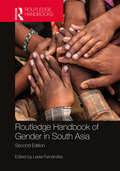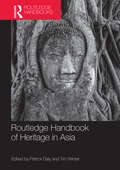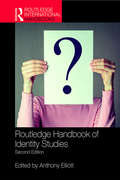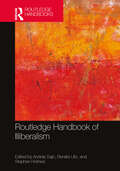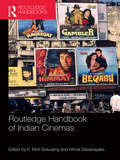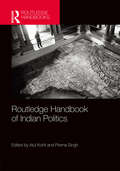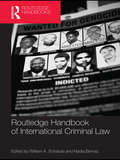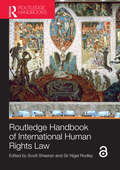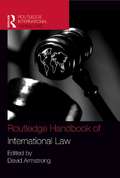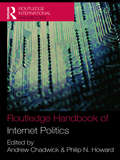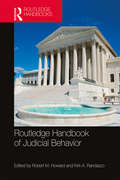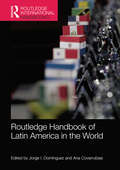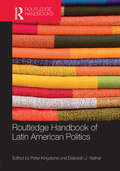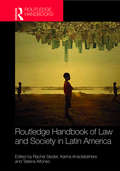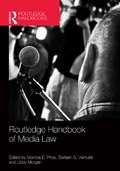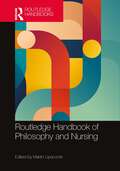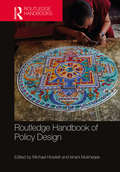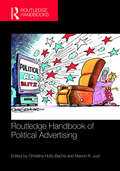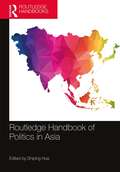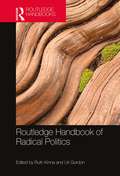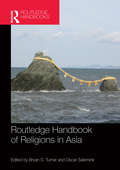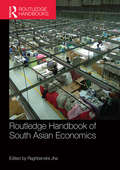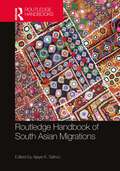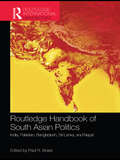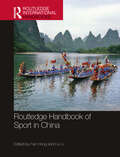- Table View
- List View
Routledge Handbook of Gender in South Asia
by Leela FernandesThis new edition of the Routledge Handbook of Gender in South Asia provides a comprehensive overview of the study of gender in South Asia. The Handbook covers the central contributions that have defi ned this area and captures innovative and emerging paradigms that are shaping the future of the field. It offers a wide range of disciplinary and interdisciplinary perspectives spanning both the humanities and social sciences, focusing on India, Pakistan, Bangladesh and Sri Lanka. This revised edition has been thoroughly updated and includes new chapters, thus adding new areas of scholarship. The Handbook is organized thematically into five major parts: • Historical formations and theoretical framings • Law, citizenship and the nation • Representations of culture, place, identity • Labor and the economy • Inequality, activism and the state The Handbook illustrates the ways in which scholarship on gender has contributed to a rethink of theoretical concepts and empirical understandings of contemporary South Asia. Finally, it focuses on new areas of inquiry that have been opened up through a focus on gender and the intersections between gender and categories, such as caste, ethnicity, sexuality, and religion. This timely study is essential reading for scholars who research and teach on South Asia as well as for scholars in related interdisciplinary fields that focus on women and gender from comparative and transnational perspectives.
Routledge Handbook of Heritage in Asia
by Tim Winter Patrick DalyThis Handbook is the first major volume to examine the conservation of Asia’s culture and nature in relation to the wider social, political and economic forces shaping the region today. Throughout Asia rapid economic and social change means the region’s heritage is at once under threat and undergoing a revival as never before. As societies look forward, competing forces ensure they re-visit the past and the inherited, with the conservation of nature and culture now driven by the broader agendas of identity politics, tradition, revival, rapid development, environmentalism and sustainability. In response to these new and important trends, the twenty three accessible chapters here go beyond sector specific analyses to examine heritage in inter-disciplinary and critically engaged terms, encompassing the natural and the cultural, the tangible and intangible. Emerging environmentalisms, urban planning, identity politics, conflict memorialization, tourism and biodiversity are among the topics covered here. This path-breaking volume will be of particular interest to students and scholars working in the fields of heritage, tourism, archaeology, Asian studies, geography, anthropology, development, sociology, and cultural and postcolonial studies.
Routledge Handbook of Identity Studies: 2nd edition (Routledge International Handbooks)
by Anthony ElliottIn this comprehensive, accessible handbook, acclaimed social theorist Anthony Elliott brings together internationally distinguished and emergent scholars in the social sciences and humanities to review the major theoretical traditions, trends and trajectories in the hugely popular field of identity studies. The Routledge Handbook of Identity Studies set new standards for reference works when first published, such was the far-reaching sweep of topics discussed – including identity studies reconfigured by feminism, post-structuralism and postmodernism, individualization theories, media and cultural studies, race and ethnicity, consumerism, environmentalism, post-colonialism, globalization and many more. This second edition of the handbook contains new contributions, including an updated general introduction from Anthony Elliott on the fast-changing conditions and contours of identity transformations in the global age. There are also new chapters on the emergence of posthuman identities - with specific focus on the global consequences of biotechnology, biomedicine, robotics and artificial intelligence for the analysis of identity - and on identity mobilities. The handbook's clear and accessible format will appeal to a wide undergraduate audience, as well as researchers and teachers, in the social sciences and humanities.
Routledge Handbook of Illiberalism
by András SajóThe Routledge Handbook of IIliberalism is the first authoritative reference work dedicated to illiberalism as a complex social, political, cultural, legal, and mental phenomenon. Although illiberalism is most often discussed in political and constitutional terms, its study cannot be limited to such narrow frames. This Handbook comprises sixty individual chapters authored by an internationally recognized group of experts who present perspectives and viewpoints from a wide range of academic disciplines. Chapters are devoted to different facets of illiberalism, including the history of the idea and its competitors, its implications for the economy, society, government and the international order, and its contemporary iterations in representative countries and regions. The Routledge Handbook of IIliberalism will form an important component of any library's holding; it will be of benefit as an academic reference, as well as being an indispensable resource for practitioners, among them journalists, policy makers and analysts, who wish to gain an informed understanding of this complex phenomenon.
Routledge Handbook of Indian Cinemas
by Wimal Dissanayake K. Moti GokulsingIndia is the largest film producing country in the world and its output has a global reach. After years of marginalisation by academics in the Western world, Indian cinemas have moved from the periphery to the centre of the world cinema in a comparatively short space of time. Bringing together contributions from leading scholars in the field, this Handbook looks at the complex reasons for this remarkable journey. Combining a historical and thematic approach, the Handbook discusses how Indian cinemas need to be understood in their historical unfolding as well as their complex relationships to social, economic, cultural, political, ideological, aesthetic, technical and institutional discourses. The thematic section provides an up-to-date critical narrative on diverse topics such as audience, censorship, film distribution, film industry, diaspora, sexuality, film music and nationalism. The Handbook provides a comprehensive and cutting edge survey of Indian cinemas, discussing Popular, Parallel/New Wave and Regional cinemas as well as the spectacular rise of Bollywood. It is an invaluable resource for students and academics of South Asian Studies, Film Studies and Cultural Studies.
Routledge Handbook of Indian Politics
by Atul Kohli Prerna SinghIndia’s growing economic and socio-political importance on the global stage has triggered an increased interest in the country. This Handbook is a reference guide, which surveys the current state of Indian politics and provides a basic understanding of the ways in which the world’s largest democracy functions. The Handbook is structured around four main topics: political change, political economy, the diversity of regional development, and the changing role of India in the world. Chapters examine how and why democracy in India put down firm roots, but also why the quality of governance offered by India’s democracy continues to be low. The acceleration of economic growth since the mid-1980s is discussed, and the Handbook goes on to look at the political and economic changes in selected states, and how progress across Indian states continues to be uneven. It concludes by touching on the issue of India’s international relations, both in South Asia and the wider world. The Handbook offers an invigorating initiation into the seemingly daunting and complex terrain of Indian politics. It is an invaluable resource for academics, researchers, policy analysts, graduate and undergraduate students studying Indian politics.
Routledge Handbook of International Criminal Law
by William A. SchabasInternational criminal law has developed extraordinarily quickly over the last decade, with the creation of ad hoc tribunals in the former Yugoslavia and Rwanda, and the establishment of a permanent International Criminal Court. This book provides a timely and comprehensive survey of emerging and existing areas of international criminal law. The Handbook features new, specially commissioned papers by a range of international and leading experts in the field. It contains reflections on the theoretical aspects and contemporary debates in international criminal law. The book is split into four parts for ease of reference: The Historical and Institutional Framework – Sets international criminal law firmly in context with individual chapters on the important developments and key institutions which have been established. The Crimes – Identifies and analyses international crimes, including a chapter on aggression. The Practice of International Tribunals – Focuses on topics relating to the practice and procedure of international criminal law. Key Issues in International Criminal Law – Goes on to explore issues of importance such as universal jurisdiction, amnesties and international criminal law and human rights. Providing easy access to up-to-date and authoritative articles covering all key aspects of international criminal law, this book is an essential reference work for students, scholars and practitioners working in the field.
Routledge Handbook of International Human Rights Law
by Scott Sheeran Nigel RodleyThe Routledge Handbook of International Human Rights Law provides the definitive global survey of the discipline of international human rights law. Each chapter is written by a leading expert and provides a contemporary overview of a significant area within the field. As well as covering topics integral to the theory and practice of international human rights law the volume offers a broader perspective though examinations of the ways in which human rights law interacts with other legal regimes and other international institutions, and by addressing the current and future challenges facing human rights. Providing up-to-date and authoritative articles covering key aspects of international human rights law, this book work is an essential work of reference for scholars, practitioners and students alike. Chapter 35 of this book is freely available as a downloadable Open Access PDF under a Creative Commons Attribution-Non Commercial-No Derivatives 3.0 license. https://www.routledgehandbooks.com/doi/10.4324/9780203481417.ch35
Routledge Handbook of International Law (Routledge International Handbooks)
by David ArmstrongThe Routledge Handbook of International Law provides a definitive global survey of the interaction of international politics and international law. Each chapter is written by a leading expert and provides a state of the art overview of the most significant areas within the field. This highly topical collection of specially commissioned papers from both established authorities and rising stars is split into four key sections: The Nature of International Law including the interaction between the disciplines of International Law and International Relations The Evolution of International Law progressing from the ancient world to present day. Law and Power in International Society discussing topical issues such as the war in Iraq and the international criminal court Key Issues in International Law including international refugee law, indigenous rights, intellectual property, trade and the challenges presented by "new terrorism". A comprehensive survey of the state of the discipline, The Routledge Handbook of International Law is an essential work of reference for scholars and practitioners of international Law.
Routledge Handbook of Internet Politics
by Philip N. Howard Andrew ChadwickThe politics of the internet has entered the social science mainstream. From debates about its impact on parties and election campaigns following momentous presidential contests in the United States, to concerns over international security, privacy and surveillance in the post-9/11, post-7/7 environment; from the rise of blogging as a threat to the traditional model of journalism, to controversies at the international level over how and if the internet should be governed by an entity such as the United Nations; from the new repertoires of collective action open to citizens, to the massive programs of public management reform taking place in the name of e-government, internet politics and policy are continually in the headlines. The Routledge Handbook of Internet Politics is a collection of over thirty chapters dealing with the most significant scholarly debates in this rapidly growing field of study. Organized in four broad sections: Institutions, Behavior, Identities, and Law and Policy, the Handbook summarizes and criticizes contemporary debates while pointing out new departures. A comprehensive set of resources, it provides linkages to established theories of media and politics, political communication, governance, deliberative democracy and social movements, all within an interdisciplinary context. The contributors form a strong international cast of established and junior scholars. This is the first publication of its kind in this field; a helpful companion to students and scholars of politics, international relations, communication studies and sociology.
Routledge Handbook of Judicial Behavior
by Robert M. Howard Kirk A. RandazzoInterest in social science and empirical analyses of law, courts and specifically the politics of judges has never been higher or more salient. Consequently, there is a strong need for theoretical work on the research that focuses on courts, judges and the judicial process. The Routledge Handbook of Judicial Behavior provides the most up to date examination of scholarship across the entire spectrum of judicial politics and behavior, written by a combination of currently prominent scholars and the emergent next generation of researchers. Unlike almost all other volumes, this Handbook examines judicial behavior from both an American and Comparative perspective. Part 1 provides a broad overview of the dominant Theoretical and Methodological perspectives used to examine and understand judicial behavior, Part 2 offers an in-depth analysis of the various current scholarly areas examining the U.S. Supreme Court, Part 3 moves from the Supreme Court to examining other U.S. federal and state courts, and Part 4 presents a comprehensive overview of Comparative Judicial Politics and Transnational Courts. Each author in this volume provides perspectives on the most current methodological and substantive approaches in their respective areas, along with suggestions for future research. The chapters contained within will generate additional scholarly and public interest by focusing on topics most salient to the academic, legal and policy communities.
Routledge Handbook of Latin America in the World
by Jorge I. Domínguez and Ana CovarrubiasThe Handbook of Latin America in the World explains how the Latin American countries have both reacted and contributed to changing international dynamics over the last 30 years. It provides a comprehensive picture of Latin America’s global engagement by looking at specific processes and issues that link governments and other actors, social and economic, within the region and beyond. Leading scholars offer an up-to-date state of the field, theoretically and empirically, thus avoiding a narrow descriptive approach. The Handbook includes a section on theoretical approaches that analyze Latin America’s place in the international political and economic system and its foreign policy making. Other sections focus on the main countries, actors, and issues in Latin America’s international relations. In so doing, the book sheds light on the complexity of the international relations of selected countries, and on their efforts to act multilaterally. The Routledge Handbook of Latin America in the World is a must-have reference for academics, researchers, and students in the fields of Latin American politics, international relations, and area specialists of all regions of the world.
Routledge Handbook of Latin American Politics
by Peter Kingstone Deborah J. YasharLatin America has been one of the critical areas in the study of comparative politics. The region’s experiments with installing and deepening democracy and promoting alternative modes of economic development have generated intriguing and enduring empirical puzzles. In turn, Latin America’s challenges continue to spawn original and vital work on central questions in comparative politics: about the origins of democracy; about the relationship between state and society; about the nature of citizenship; about the balance between state and market. The richness and diversity of the study of Latin American politics makes it hard to stay abreast of the developments in the many sub-literatures of the field. The Routledge Handbook of Latin American Politics offers an intellectually rigorous overview of the state of the field and a thoughtful guide to the direction of future scholarship. Kingstone and Yashar bring together the leading figures in the study of Latin America to present extensive empirical coverage, new original research, and a cutting-edge examination of the central areas of inquiry in the region.
Routledge Handbook of Law and Society in Latin America
by Rachel Sieder Karina Ansolabehere Tatiana A. Alfonso SierraAn understanding of law and its efficacy in Latin America demands concepts distinct from the hegemonic notions of "rule of law" which have dominated debates on law, politics and society, and that recognize the diversity of situations and contexts characterizing the region. The Routledge Handbook of Law and Society in Latin America presents cutting-edge analysis of the central theoretical and applied areas of enquiry in socio-legal studies in the region by leading figures in the study of law and society from Latin America, North America and Europe. Contributors argue that scholarship about Latin America has made vital contributions to longstanding and emerging theoretical and methodological debates on the relationship between law and society. Key topics examined include: The gap between law-on-the-books and law in action The implications of legal pluralism and legal globalization The legacies of experiences of transitional justice Emerging forms of socio-legal and political mobilization Debates concerning the relationship between the legal and the illegal. The Routledge Handbook of Law and Society in Latin America sets out new research agendas for cross-disciplinary socio-legal studies and will be of interest to those studying law, sociology of law, comparative Latin American politics, legal anthropology and development studies.
Routledge Handbook of Media Law
by Monroe E. Price Stefaan Verhulst Libby MorganFeaturing specially commissioned chapters from experts in the field of media and communications law, this book provides an authoritative survey of media law from a comparative perspective. The handbook does not simply offer a synopsis of the state of affairs in media law jurisprudence, rather it provides a better understanding of the forces that generate media rules, norms, and standards against the background of major transformations in the way information is mediated as a result of democratization, economic development, cultural change, globalization and technological innovation. The book addresses a range of issues including: Media Law and Evolving Concepts of Democracy Network neutrality and traffic management Public Service Broadcasting in Europe Interception of Communication and Surveillance in Russia State secrets, leaks and the media A variety of rule-making institutions are considered, including administrative, and judicial entities within and outside government, but also entities such as associations and corporations that generate binding rules. The book assesses the emerging role of supranational economic and political groupings as well as non-Western models, such as China and India, where cultural attitudes toward media freedoms are often very different. Monroe E. Price is Director of the Center for Global Communication Studies at the Annenberg School for the University of Pennsylvania and Joseph and Sadie Danciger Professor of Law and Director of the Howard M. Squadron Program in Law, Media and Society at the Cardozo School of Law. Stefaan Verhulst is Chief of Research at the Markle Foundation. Previously he was the co-founder and co-director, with Professor Monroe Price, of the Programme in Comparative Media Law and Policy (PCMLP) at Oxford University, as well as senior research fellow at the Centre for Socio Legal Studies. Libby Morgan is the Associate Director of the Center for Global Communication Studies at the Annenberg School for the University of Pennsylvania.
Routledge Handbook of Philosophy and Nursing
by Martin LipscombPhilosophy offers a means of unpacking and grappling with important questions and issues relevant to nursing practice, research, scholarship, and education. By engaging in these discussions, this Handbook provides a gateway to new understandings of nursing. The Handbook, which is split loosely into seven sections, begins with a foundational chapter exploring philosophy’s relationship to and with nursing and nursing theory. Subsequent sections thereafter examine a wide range of philosophic issues relevant to nursing knowledge and activity. Philosophy and nursing, philosophy and science, nursing theory. Nursing’s ethical dimension is described. Philosophic questions concerning patient care are investigated. Socio-contextual and political concerns relevant to nursing are unpacked. Contributors tackle difficult questions confronting nursing. Difficulties around speech, courage, and race/otherness are discussed. Philosophic questions pertaining to scholarship, research, and technology are addressed. International in scope, this volume provides a vital reference for all those interested in thinking about nursing, whether students, practitioners, researchers, or educators.
Routledge Handbook of Policy Design
by Michael Howlett Ishani MukherjeeUniting theoretical bases and advancements in practice, the Routledge Handbook of Policy Design brings together leading experts in the academic field of policy design in a pioneering effort of scholarship. Each chapter provides a multi-topic overview of the state of knowledge on how, why, where or when policies are designed and how such designs can be improved. These experts address how a new emphasis on effective policy design has re-emerged in public policy studies in recent years and clarify the role of historical policy decisions, policy capacities and government intentions in promoting a design orientation towards policy formulation and policy-making more generally. They examine many previously unexplored aspects of policy designs and designing activities, which focus upon analyzing and improving the sets of policy tools adopted by governments to correct policy problems. Ranging from the fundamentals of policy design and its place in greater policy studies, to new questions regarding policy design content and effectiveness, to contemporary design trends such as the use of digital tools and big data, the Routledge Handbook of Policy Design is a comprehensive reference for students and scholars of public policy, public administration and public management, government and business.
Routledge Handbook of Political Advertising (Routledge International Handbooks)
by Marion R. Just Christina Holtz-BachaThis Handbook provides the most comprehensive overview of the role of electoral advertising on television and new forms of advertising in countries from all parts of the world currently available. Thematic chapters address advertising effects, negative ads, the perspective of practitioners and gender role. Country chapters summarize research on issues including political and electoral systems; history of ads; the content of ads; reception and effects of ads; regulation of political advertising on television and the Internet; financing political advertising; and prospects for the future. The Handbook confirms that candidates spend the major part of their campaign budget on television advertising. The US enjoys a special situation with almost no restrictions on electoral advertising whereas other countries have regulation for the time, amount and sometimes even the content of electoral advertising or they do not allow television advertising at all. The role that television advertising plays in elections is dependent on the political, the electoral and the media context and can generally be regarded as a reflection of the political culture of a country. The Internet is relatively unregulated and is the channel of the future for political advertising in many countries
Routledge Handbook of Politics in Asia
by Shiping HuaThe Routledge Handbook of Politics in Asia is designed to serve as a comprehensive reference guide to politics in Asia. Covering East, South, Southeast, and Central Asia, this handbook brings together the work of leading international academics to cover the political histories, institutions, economies, and cultures of the region. Taking a comparative approach, it is divided into four parts, including: A thorough introduction to the politics of the four regions of Asia from the perspectives of democratization, foreign policy, political economy, and political culture. An examination of the "Big Three" of Asia – China, India, and Japan – focusing on issues including post-Mao reform, China’s new world outlook, Indian democracy, and Japanese foreign policy. A discussion of important contemporary issues, such as human rights, the politics of the internet, security, nationalism, and geopolitics. An analysis of the relationship between politics and certain theoretical ideas, such as Confucianism, Hinduism, socialist constitutionalism, and gender norms. As an invaluable and all-inclusive resource, this handbook will be useful for students, scholars, researchers, and practitioners of Asian politics and comparative politics.
Routledge Handbook of Radical Politics
by Uri Gordon Ruth KinnaSuccessive waves of global protest since 1999 have encouraged leading contemporary political theorists to argue that politics has fundamentally changed in the last twenty years, with a new type of politics gaining momentum over elite, representative institutions. The new politics is frequently described as radical, but what does radicalism mean for the conduct of politics? Capturing the innovative practices of contemporary radicals, Routledge Handbook of Radical Politics brings together leading academics and campaigners to answer these questions and explore radicalism’s meaning to their practice. In the thirty-five chapters written for this collection, they collectively develop a picture of radicalism by investigating the intersections of activism and contemporary political theory. Across their experiences, the authors articulate radicalism’s critical politics and discuss how diverse movements support and sustain each other. Together, they provide a wide-ranging account of the tensions, overlaps and promise of radical politics, while utilising scholarly literatures on grassroots populism to present a novel analysis of the relationship between radicalism and populism. Routledge Handbook of Radical Politics serves as a key reference for students and scholars interested in the politics and ideas of contemporary activist movements.
Routledge Handbook of Religions in Asia
by Bryan S. Turner and Oscar SaleminkThe Routledge Handbook of Religions in Asia provides a contemporary and comprehensive overview of religion in contemporary Asia. Compiled and introduced by Bryan S. Turner and Oscar Salemink, the Handbook contains specially written chapters by experts in their respective fields. The wide-ranging introduction discusses issues surrounding Orientalism and the historical development of the discipline of Religious Studies. It conveys how there have been many centuries of interaction between different religious traditions in Asia and discusses the problem of world religions and the range of concepts, such as high and low traditions, folk and formal religions, popular and orthodox developments. Individual chapters are presented in the following five sections: Asian Origins: religious formations Missions, States and Religious Competition Reform Movements and Modernity Popular Religions Religion and Globalization: social dimensions Striking a balance between offering basic information about religious cultures in Asia and addressing the complexity of employing a western terminology in societies with radically different traditions, this advanced level reference work will be essential reading for students, researchers and scholars of Asian Religions, Sociology, Anthropology, Asian Studies and Religious Studies.
Routledge Handbook of South Asian Economics
by Raghbendra JhaThe Routledge Handbook of South Asian Economics addresses the recent economic transformation in South Asia. Leading experts in the field look at the major economic achievements and challenges for the region and examine why economic development across the South Asia region has diverged so significantly since the early 1990s. Providing a cutting-edge review of the economies of South Asia, the Handbook analyzes key growth areas as well as key structural weaknesses and policy challenges facing these economies. Furthermore, it anticipates trends and suggests corrective measures for the South Asian economic region. Sections focus on issues of human development, such as inequality, poverty and quality of schooling, and monetary and fiscal issues, particularly in light of the ongoing global financial crisis. Further sections discuss issues relating to employment and infrastructure, and on the experience of the region with international trade and financial flows, and environmental challenges. Written by renowned and respected experts on South Asian economics, this Handbook will be an invaluable reference work for students and academics as well as policy makers interested in South Asian Studies, Economics and Development Studies.
Routledge Handbook of South Asian Migrations
by Ajaya K. SahooRoutledge Handbook of South Asian Migrations presents cutting-edge research on South Asian migrants written from a diverse theoretical and methodological perspective by leading scholars from around the world. This book provides a comprehensive understanding of how South Asians negotiate and promote South Asian culture both within and outside the region while undergoing several challenges during the process of migration. The Handbook covers many dimensions of South Asian migrations written by leading scholars from across the world, including but not limited to sociology, history, anthropology, economics, political science, geography, education, psychology, literature, and cultural studies. Divided thematically into five broad sections the chapters critically analyse some of the pertinent issues of South Asian migrations: • Contextualizing South Asian Migrations • Migration, Language, and Identity • Politics of Migration and Development • Gender, Culture, and Migration • Migration, Diaspora, and Transnationalism Addressing these issues from a multidisciplinary, multigenerational, multiracial, and multi-ethnic perspective, the Routledge Handbook of South Asian Migrations fills a gap in the literature and is an invaluable resource for students and scholars throughout the social sciences and humanities.
Routledge Handbook of South Asian Politics: India, Pakistan, Bangladesh, Sri Lanka, and Nepal
by Paul R. BrassThe Routledge Handbook of South Asian Politics examines key issues in politics of the five independent states of the South Asian region: India, Pakistan, Bangladesh, Sri Lanka, and Nepal. Written by experts in their respective areas, this Handbook introduces the reader to the politics of South Asia by presenting the prevailing agreements and disagreements in the literature. In the first two sections, the Handbook provides a comprehensive introduction to the modern political history of the states of the region and an overview of the independence movements in the former colonial states. The other sections focus on the political changes that have occurred in the postcolonial states since independence, as well as the successive political changes in Nepal during the same period, and the structure and functioning of the main governmental and non-governmental institutions, including the structure of the state itself (unitary or federal), political parties, the judiciary, and the military. Further, the contributors explore several aspects of the political process and political and economic change, especially issues of pluralism and national integration, political economy, corruption and criminalization of politics, radical and violent political movements, and the international politics of the region as a whole. This unique reference work provides a comprehensive survey of the state of the field and is an invaluable resource for students and academics interested in South Asian Studies, South Asian Politics, Comparative Politics and International Relations.
Routledge Handbook of Sport in China (Routledge International Handbooks)
by Fan Hong Liu LiThis is the first book to offer a comprehensive overview of the history and development of sport from the ancient to the contemporary era in China. It addresses the gap between the vibrant academic scholarship within China and the limited understanding of Chinese sport outside of the country. It opens different perspectives on Chinese sport and addresses a wide range of issues central to the development of sport in the context of Chinese culture, politics, economy, and society. It explores a diverse set of topics including the history of Chinese traditional sport, the rise of modern sport and the Olympic movement, sport and nationhood, sport and politics and international relations, sport and physical education, sport and economy and commerce, sport and social stratification and diversity, and sport leisure and tourism. It offers critical insights into the multifaceted world of China, past and present—a contribution to our collective knowledge and understanding of Chinese sport and society—and is useful reading for students, researchers, and professionals with an interest in the field of China and Chinese sport. This Handbook has been contributed to by a team consisting of 88 leading Chinese and Asian experts and scholars with varied backgrounds of studying and working in European, North American, and Australian universities, as well as Western scholars with expertise on China and its sports system and practice. It is composed of ten parts classified by different subjects. It provides a wide lens through which to better contextualise the relationships between China and the world within the global sport community. The Routledge Handbook of Sport in China is a vital resource for students and scholars studying the history, politics, sociology, culture and policy of sport in China, as well as sport management, sport history, sport sociology, and sport policy and politics. It is also valuable reading for those who are working in international sport policy making and sport organisations.
